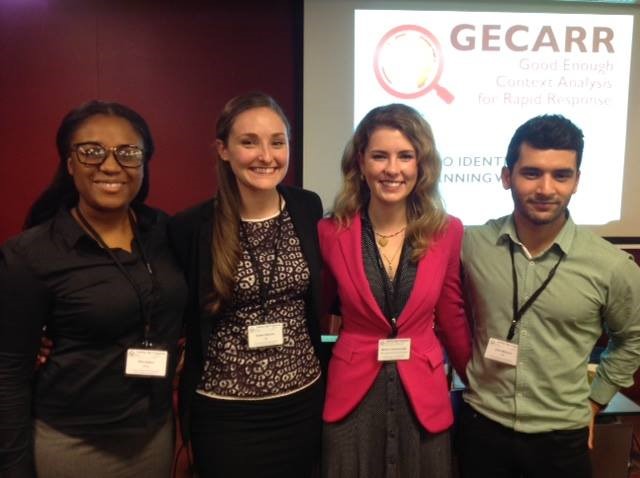Student experience: The third Development Management Workshop focused on a topic often relegated to the margins of development studies – the role of religion.
Due to long-standing trends of secularisation in Europe and elsewhere in the Western world, religion has been taken less and less seriously by policy makers, diplomats, development practitioners and academics alike. Social scientists, for instance, often consider it only a cover for the real underlying socio-economic or political factors. At the same time, academics and practitioners in the field of development work on countries where religion may play a much more important role, but often without actively reflecting on the implications this has for development work. The Reverend Dr James Walters sought to challenge some of the often implicit secular assumptions underlying development work, and invited students to think about and discuss the role religion plays in development.
Central to Dr Walters’ argument was the claim that without recognising that people have different conceptions of what the “good life”, the “good society”, or “human flourishing” are, and that for large parts of humanity religion is the main source of inspiration for their conception, it will be difficult for policy makers, diplomats, development practitioners, and others to engage with populations in developing countries, amongst whom religiosity is the rule, not the exception.
Dr Walters showed that the world is currently becoming more and not less religious, therefore contradicting an assumed global march towards secularism. Projections by Pew, for example, show that in 2050, the share of the religiously unaffiliated in the world population will drop to 13.2%, down from 16.4% in 2010. Dr Walters did not only want to challenge the idea that “religion is going away”, but also two other widely held, liberal-secular assumptions: namely that religion is a matter of personal beliefs, and that secularism is neutral. Dr Walters argued that it follows from the history of European thought that progressively religion was considered a matter of pure personal beliefs one may or may not hold but that are otherwise irrelevant for how societies and polities work. But this is not the case across the globe, where it is often more common to believe that religion should not be confined such a role. This also explains why, to the people who hold such beliefs, secularism will not appear to be the neutral, value-free concept that secularists themselves often believe to be. To them, secularism will constitute a negative normative judgment on their notion of “human flourishing”.
The question remains: How can religion best be approached, and what concepts can be used to make sense of it? Dr Walters departed from the view that what is necessary would just be an understanding of the core tenets and practices of different religions, and instead insisted on the importance of a more expansive view of religion he dubbed “religious imagination”. He argued that humans do not see the world entirely empirically, but that everyone has ideas and assumptions that organise how we see and perceive the world. This includes “secular imagination”, one example being the nationalist imagination, the belief in belonging to a larger national community. Thus, what matters most is to get a clearer sense of how people understand the world and their place within it, and how this affects the way they interact with it.
To that end, Dr Walters recommended a book by social psychologist Jonathan Haidt (“The Righteous Mind – Why Good People Are Divided by Politics and Religion”), a review of which had been circulated in advance. Haidt argues that the Western-liberal world view rests largely on the care/harm and the fairness/cheating foundations. But Haidt argues that in other cultural contexts and traditions, in particular more religious ones, other foundations for moral reasoning may be equally formative: loyalty/betrayal, authority/subversion and sanctity/degradation. The fact that people who were socialised in the Western-liberal tradition are less and less familiar with these other dimensions of moral reasoning has, according to Haidt, become a potential source of tension and, as Dr Walters pointed out, also creates new challenges in the field of development.
In the final section of the workshop, participants divided themselves up into small groups in order to work on concrete case studies examining how some of these challenges can play out in a development context. Among the four case studies discussed, the most prominent covered lessons learned in the wake of the response to the Ebola outbreak. Measures against the spread of the disease, some of which involved the separation of the ill from their families, and burial procedures which ran again cultural values and religious practices, were often ignored. Religious burial rites had, for example, facilitated direct physical contact with infected bodies. The importance people attached to obeying religious and cultural norms that from their perspective were crucial to them and their loved ones obtaining everlasting life, or to the protection of their community’s social fabric, was underestimated. Aid organisations therefore engaged with religious leaders in order to get them involved in explaining and justifying certain health protection measures to their communities. After this happened, more people followed expert guidelines.
This article was written by a student who wishes to remain anonymous.
The views expressed in this post are those of the author and in no way reflect those of the International Development LSE blog or the London School of Economics and Political Science.





